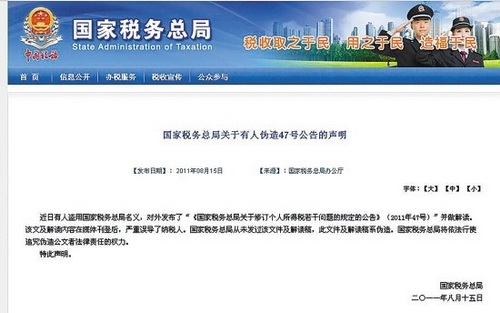


Who ‘Buried’ Wang Yongping?
By Wen Shuping (温淑萍), a reporter with the EO's News section
Aug 17, 2011
Economic Observer Online
Original article: [Chinese]
Wang Yongping was removed from his position as spokesperson for the Ministry of Railways yesterday.
Some people have joked that this is yet another “great feat” of the Ministry of Railways - after burying the high-speed train, they’re now burying Wang Yongping. But who is it that has buried Wang? The officials in charge of the Ministry of Railways or the culture that governs how the department is run?
There are some who think that it was the two lines from Wang’s press conference that went on to become viral internet memes - “Whether you believe it or not, I certainly do” and “it was a miracle” – that helped to keep the public eye focused on the Wenzhou train crash and this is why the Ministry of Railways is willing to ‘bury’ him.
In fact, in a department that is rooted in the culture of secrecy and unaccountability, Wang was one of the few people attempting to open up the ministry to the public; we could even go as far to say he was a victim of the department.
Only one hour after the Wenzhou train crash, Wang was pushed into the spotlight. Despite the severity of the accident and the amount of media attention, none of the high-level officials in the Ministry of Railways appeared at the press conference, putting all the pressure on Wang.
The fact is, that no matter what he said, in the absence of other high level officials and given the department's culture of not allowing people to speak the truth, Wang was always going to be criticized.
Now, not even one month after the accident, as the heat of the debate surrounding his performance gradually subsides, Wang Yongping has once again been pushed in to the spotlight to become the scapegoat for the Ministry of Railways.

The Instinctive Reaction of Officials to a Scandal: Deny Everything
By Sheng Chao (盛超), an editor with the Economic Observer Online
Nation, page 15
Issue No. 532, Aug 15, 2011
Original article: [Chinese]
Images that circulated online in the first week of August allegedly showed an official from Kunming’s Municipal Development and Reform Commission taking part in an orgy. The appearance of the photos prompted the Public Security Bureau in Yunnan’s capital to reveal on Aug 9 that the official involved was the victim of an extortion attempt.
Prior to that announcement, local officials had offered a wide range of responses to the online “sex photo scandal.” Initially they had said that the person in the photos didn’t belong to their unit. The following day they changed their mind. The media then cited a public information office statement that the Public Security Bureau had “confirmed that the sex photos were fake”. Then, that information office denied ever releasing this news.
Why were there so many denials? This isn’t the first time that officials have issued an immediate denial as soon as a scandal erupts. It happened after the Wenzhou train crash, when people were asking questions about the burial of one of the carriages; after the reports of the destruction of an artifact held in the Forbidden City; and after details surfaced of the melamine milk scandal.
It seems that denial has become the reflex response of officials. Officials think they can control public awareness. As long as everything is under their control, public involvement is unnecessary; let alone public supervision. It’s as though there’s no need for public awareness.
This mindset is out of date. We need a service-oriented administration, which is also what our government has proposed.
There’s another term for officials; civil servants - those who provide services to the people. Thus the least that officials could do is provide the facts to the public instead of automatically attempting to hide the truth. We need the public to keep seeking the truth and to examining the evidence for themselves in order to make civil servants aware that denial or silence is not the solution.

The Children of Migrant Workers are Entitled to an Education Too
By Xie Liangbin (谢良兵), a reporter with the EO’s Nation Section
Aug 16, 2011
Economic Observer Online
Original article: [Chinese]
Two media reports have attracted attention recently: one described the closure of 30 Beijing schools that cater to the children of the city’s migrant workers, affecting almost 30,000 pupils who lack a Beijing Hukou (household registration). The other story is about how China’s Project Hope (希望工程) plans to fund the construction of 1,000 primary schools in Africa over the coming 10 years.
Shutting down the schools of migrant workers’ children not only hurts those pupils and their parents, but also damages the image of the capital and even undermines public trust in government.
“Why can’t our children receive education here, we have also made our contribution to Beijing?” one parent asked. The Compulsory Education Law is clear - all school-aged children must receive compulsory education. But these children cannot really enjoy their rights under the current Hukou system.
What will happen to these school children when the autumn semester starts? The government has explained that they will be diverted to public schools. While, deep down, their parents knew that their children will be excluded from public schools by all kinds of conditions.
In this way, Beijing is actually extending its policy of “population regulation and control” – the use of administrative means to exclude outsiders from Beijing. These kinds of measures are unworthy of a country that seeks recognition of its “market economy” status from other countries.
International metropolises like New York and London have never used administrative means to exclude outsiders from taking up residence. Their leaders understand that freedom of movement is a basic human right.
Shutting down schools for migrant worker’s children is unjust and damages social harmony and stability. The local government should seriously reconsider its decision.

Fake Tax Document Reveals Real Problems
By Xin Haiguang (信海光), a media commentator who also writes for FT Chinese
Aug 16, 2011
Economic Observer Online
Original article: [Chinese]
Recently a fake tax announcement purporting to be from the State Administration of Taxation was produced, official Chinese media including Xinhua News Agency and CCTV reported the news as if it was genuine. The fake notice detailed “changes” to the method for calculating how annual bonuses will be taxed.
Although this was a fake document, it has revealed a few very real problems.
First, the media need to be held accountable, how was this fake document able to be presented as a genuine government annoucement. According to common sense, when journalists first pick up news, they should check the source in order to verify its authenticity.
Another issued raised by this incident is whether the people responsible for the hoax should be punished? According to Article 280 of China’s criminal law, the crime of forgery of state official documents can result in a maximum sentence of between 3 and 10 years.
However, I think the author of the fake document was only attempting to express his or her dissatisfaction with current tax policy. If the State Administration of Taxation can be tolerant and just laugh the situation off, then this result should be welcomed by the public.
Finally, this fake document was able to spread so widely and attract so much public attention because it touched upon problems with existing tax policy. Some people even went so far as to praise the hoax as a “perfect new policy”. Will the State Administration of Taxation take note of the popularity of the fake notice and perhaps introduce something similar?
The Way We View Modern Marriage
By Yu Ge (羽戈), media commentator
Aug 15, 2011
Economic Observer Online
Original article: [Chinese]
This translation first appeared on the Worldcrunch
Three days ago, the “Third Interpretation of Several Issues concerning The Marriage Law ” was published and promulgated. Just as in the past, every time there’s a modification of “The Marriage Law,” there is a flood of cynical comments and complaints, as if an ethical earthquake has struck the foundation of our marriages and families.
In fact, the only controversy about this modification lies in the seventh item: When parents purchase, at their expense, real estate for their child after he or she is married, and register the property in the name of their child, the property is recognized to be that person’s personal property; if the real estate is purchased by parents of both sides, and the property registration is in the name of one of the spouses, the ownership is in accordance with the investment share of the total of both sides’ parents.
One media commentator quipped: “ Men’s parents are laughing while women’s parents are crying,” in response to the new decree. Some people say that from now on, women’s mothers, who used to require that “the boy provide a house as a prerequisite” for marrying their daughters, should now require that “no matter whose parents paid for the house, the girl’s name is to appear in the real estate registration.”
It has been known as a precious rule for urban women: a man with a car, a house, and without living parents, is an ideal partner. Now the concept packs even more punch: if the boy’s parents are both dead, the trouble that accompanies their existence won’t appear. But then of course, women and their parents need to make a lot more effort to make sure that the wife’s name will appear on the real estate certificate.
Before this modification of the Marriage Law, it was stipulated that: when one side of the parents buys real estate for their married child, unless it is clearly expressed that the right is donated to only one party, the ownership of the real estate is presumed to be jointly shared by the couple. In other words, though the new decree makes a totally different interpretation as to how the couple share their rights, particularly in the case of divorce, both laws hold the parents’ will in absolute respect.
In theory, as long as the daughter-in-law or son-in-law fulfills his or her filial piety, the law will not harm either party. Nevertheless, the change of the law reflects changes in Chinese society. For starters, like its super rapid economic development, China has also seen a skyrocketing divorce rate over the past six years. In Beijing, Shanghai and Canton, the divorce rates were 39%, 38%, and 35% respectively at the end of last year, according to Chinese official statistics.
But more generally, people used to care more about family ethics; while nowadays, people pay more attention to individual rights. A husband and a wife are above all two independent civil bodies, before they are a couple identified and connected by the marriage certificate.
In this way, individual rights are independent of the couple’s marital relationship. In some people’s eye, this is a rather cold way, even contrary to public order and public good.
But this reflects the transformation of the judicial meaning of marital law, i.e. if the marriage used to be defined from an ethical point of view, now it’s defined from a contractual perspective.
Some commentators say that the new judicial interpretation of the marital law will change Chinese people’s concepts about marriage itself, as well as the way women choose their husbands, and certain ideas about reproduction.
We should remember that the first document to be drawn up after the birth of the People’s Republic of China in 1949 was The Marriage Law, not the Constitution.
So is the change a bad thing after all? The demand that a man provide a woman with a house before he proposes is in its origin absurd anyway. Though it appeared to protect women’s rights, it in fact puts women in a vulnerable position.
Furthermore, both sexes should be equal and treat each other fairly. When parents have worked hard all their life and buy a house for their married son, it is also unfair that in the case of a divorce, their daughter-in-law could walk away one day with half of the property.
None of this might be acceptable for those who hold a romantic view of marriage. Still, it is the true meaning of the Marriage Law. Not meant to be morality, law is there to define rights. Rather than being a question of the Marriage Law, this debate is a litmus test for one’s very concept about marriage and the world

The Soil that Nurtures Rumor
By Hu Yong (胡泳), an associate professor at Peking University
Business Review, page 42
Issue No. 532, Aug 15, 2011
Original article: [Chinese]
This translation first appeared on the China Media Project website
This is an age pervaded by rumor. On July 28, People's Daily Online summed up eight big rumors surrounding the Wenzhou train collision. On August 3, China Central Television\'s Morning News program reported under the title "Where is the ethical bottom line on microblogs?" the story of how one user on QQ Microblog called "Guo Yao" (郭瑶) had impersonated the relative of a crash victim.
In the CCTV report, a member of the so-called Anti-Rumor League, [identified as] “a group of self-organizing enthusiastic web users working as rumor busting volunteers,” endorsed the idea of a “moral bankruptcy” (沦丧) in the ethics of microblogs. This group, formed on May 18 [this year], says that it has thus far been involved in the busting of more than one-hundred [online] rumors. But it was in the midst of the incident of the [Wenzhou] train collision [on July 23] that the group was cast into some doubt, accused of “selectively busting rumors” (选择性辟谣) and “only busting popular rumors, not busting official rumors” [or falsehoods] (只辟民谣,不辟官谣). Some even suggested in the fiercest of words that the Anti-Rumor League was “a platform carrying out directed attacks from a predefined political position as it hoists the signboard of rumor busting.”
Li Mu (李牧), a core figure in the League, also admits that it was wrong of the Anti-Rumor League to trust overly in the Ministry of Railways during the “7.23″ incident. Excessive trust in the declarations of the government, and the use of official government news releases in countering many rumors is a major defect of the Anti-Rumor League. The publicity slogan of the Anti-Rumor League is “serving the truth” (为真相服务), but there’s a little something about the operation of current politics that everyone is clear about, and that is that the government is not just a natural provider of the truth. Very often, it is the government that is guilty of the “original sin,” and harboring skepticism towards it is very reasonable.
As for the charge of “selectively busting rumors,” the principal founder of the Anti-Rumor League, Wu Fatian (吴法天), has responded: “The orientation of the Anti-Rumor League is about being a spontaneous organization of self-discipline among web users in the We Media age, and what it mainly does is issue accurate information about microblog rumors, so it works through microblog posting by the public.” At first glance, it seems this starting off point would yield few misgivings. Microblogs are certainly not a clean and blameless territory, and spontaneous popular action to exercise self-discipline over speech on microblogs accords with the basic character of self organization in the We Media era. But if we look more carefully, the act of chiefly targeting “popular rumors” in rumor busting actually suggests a major deficiency of wisdom: it perhaps actively covers up or passively overlooks a hard fact of contemporary society, which is that official lies (官方的谎言) outpace popular rumors, constituting the greatest interference and obstruction with the truth.
When the goal of busting rumors is to get at the truth this is a good thing. But if rumor busters stand solely on the side of the government to blacken and attack popular public opinion, this isn’t in the interest of discovering the facts and the truth but in fact serves the goal of so-called channeling of public opinion (舆论引导), thereby serving as a tool aiding and abetting those people and organizations that endeavor to twist the truth.
In many online incidents, “strengthening channeling of public opinion” and “handling rumor according to the law” have appeared in the same directives [from press control authorities], and this is a tactic we have seen from the government for a long time. We can say that in fact it is the conduct of “strengthening channeling of public opinion” that has caused official information to be so wanting in credibility, which has in turn nurtured a rich soil for the transmission of “rumors.” On the one hand, the government has provided an environment conducive to the spread of rumors, and on the other it sternly lashes out against rumors, placing itself in the midst of an insoluble contradiction.
Since the SARS epidemic in 2003, the massive losses and risks that come with the suppression of media coverage of sudden-breaking incidents by relevant government departments have been illustrated again and again. As the media say nothing, or become representatives of the discourse of those in power, this inevitably becomes the principal reason for the spread of rumor and social panic.
Under [the policy of] “correct guidance of public opinion” the traditional media only selectively report major social and political events, and the standards are entirely within their hands. Whatever is regarded as negative (反面), destructive (消极), disturbing (添乱), discrediting (抹黑) is not permitted, and everything that is regarded as positive (正面), constructive (积极), encouraging (鼓劲) and praising (添彩) is openly proclaimed. Their basic criterion for deciding [what is positive or negative] is whether or not something poses a danger to social stability, and they care nothing for whether or not damage is done to the public’s right to know, or whether their actions might pose a grave danger to the life and property of the people.
When normal social communication mechanisms are crippled, abnormal communication mechanisms will be enlivened. Hearsay about sudden-breaking incidents is mostly transmitted by word of mouth, through instant messaging, online forums (and later added to microblogs), and communication much earlier than for formal releases in newspapers, television, radio and other traditional forms of media. People are much more inclined to believe rumors of uncertain provenance than they are to believe official news reports by newspapers, television and other mass media, which creates a situation in which “news looks like rumor and rumor looks like news.” Under the control of the government, transmission methods that are twisted by administrative power have exactly the opposite of their intended effect in an environment in which rumors are widely disseminated.
Links and Sources
China Daily: Wang Yongping at Press Conference
China News Agency: Goodbye Wang Yongping Image
Baidu Beat: NDRC official in Kunming exposed in lewd photos
China Daily: Image of Man lying on road
World Crunch: The Meaning of Marriage in Modern China
China Media Project: Control, the soil that nurtures rumor

